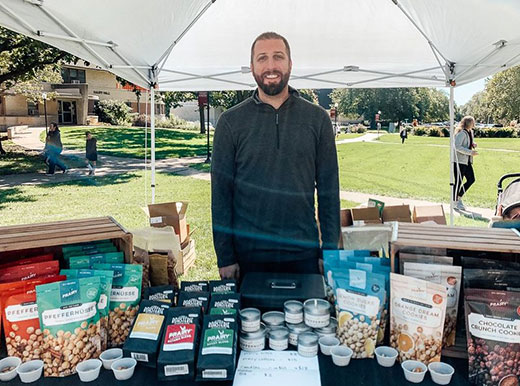
Aaron Gaedert, owner of Prairy, a specialty food and drink store in Newton.| Download this photo
Kansas Profile – Now That’s Rural: Aaron Gaeddert, Prairy
December 18, 2019
By Ron Wilson, director of the Huck Boyd National Institute for Rural Development at Kansas State University.
Here we are at a winery in Massachusetts. Between the samples of wine, we are offered some wine-tasting crackers which help cleanse the palate between wine tastings. Where did they come from? They came from halfway across the country in rural Kansas. It’s one of the healthy products offered by this innovative store in the heartland of the nation.
Last week we met Joel Gaeddert who founded Flint Hills Design in North Newton. His younger brother Aaron also operates a small business.
Aaron came to Newton to attend Bethel College, as had his parents and his older brother Joel. When Joel founded Flint Hills Design, Aaron worked for him during college and after graduation. In 2014, he had the opportunity to pursue a business of his own.
Newton had a local food cooperative that closed in 2000. After it closed, a couple of women bought some of the supplies and equipment and opened a bulk health food store of their own. It was called Prairie Harvest. They later relocated into a historic 1892 building in downtown Newton.
In 2014, Aaron Gaeddert and family had the opportunity to purchase the business. He has expanded it over time.
The business has recently been rebranded as Prairy. That’s Prairy spelled with a Y as in the title of the book PrairyErth by the author William Least-Heat Moon. That book is about Chase County in the heart of the Flint Hills of Kansas.
Prairy is now the overall name for this multifaceted business. “We began as a full line natural foods store but we have branched out and expanded,” Aaron said. The business now includes a deli restaurant, catering, wholesale products, and online sales.
“When we started, natural foods was a niche,” he noted. “Now it has become more mainstream. We’re evolving toward specialty foods and drinks, with an emphasis on locally grown products.”
The Prairy store now offers local and organic produce, locally supplied meat from area farmers and ranchers, and bulk foods and spices. These include bulk grains, beans, coffee, tea, and more. Customers of the bulk products can buy containers and then pick up as much or as little of the products as needed.
Prairy has also opened a juice bar which offers made-in-Kansas kombucha and cold brewed coffee. The in-store restaurant offers a hot lunch, Monday through Saturday. Hot food options usually include soup and homemade comfort foods such as pot pie, mac and cheese, taco bar, or something similar.
Their historic building downtown has a mezzanine which has been converted into a beautiful event space. The next natural progression was to do catering there. Prairy catering can cover everything from formal five-course meals to party platters and appetizers.
Another product line is offered for online shopping. Those products include Prairy Bites, Prairy Provisions, and Prairy Life. Prairy Bites are bite-size cookies and crackers, inspired by the German Mennonite tradition of pfeffernusse. “Our grandmother made German spice cookies,” Aaron said. The previous owners had purchased a peppernut cookie business from a woman in the nearby rural community of Goessel, population 539 people. Now, that’s rural.
They used these classic family recipes and expanded the business. “My sister-in-law’s grandmother had a Swedish cookie recipe,” Aaron said. They added other cookie flavors such as chocolate crunch, orange dream and lemon sugar, in addition to the afore-mentioned wine tasting crackers. There are wheat-free and anise-free options as well.
Prairy Provisions includes various types of trail mixes and granola, plus coffee, peanut butter, and more. Prairy Life refers to a line of prairie-themed greeting cards and candles.
All these products are available online. These products have gone from California to New York.
For more information, go to www.prairy.com.
It’s time to leave this winery in Massachusetts where we found wine-tasting crackers which came from Kansas. We salute Aaron Gaeddert for making a difference with entrepreneurial expansion based on healthy foods. It certainly leaves a good taste in my mouth.
And there’s more. We’ve met Aaron and Joel, but there was one more brother. He followed the entrepreneurial trail also. We’ll learn about his business next week.
Audio and text files of Kansas Profiles are available at http://www.kansasprofile.com. For more information about the Huck Boyd Institute, interested persons can visit http://www.huckboydinstitute.org.
----------------
The mission of the Huck Boyd National Institute for Rural Development is to enhance rural development by helping rural people help themselves. The Kansas Profile radio series and columns are produced with assistance from the K-State Research and Extension Department of Communications News Media Services unit. A photo of Ron Wilson is available at http://www.ksre.ksu.edu/news/sty/RonWilson.htm.

